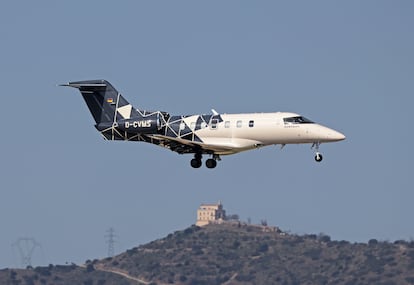Each private jet emits as much in a year as 177 cars, study finds
A report by the International Council on Clean Transportation shows that business jets generated as many emissions in 2023 as all the flights that departed from Heathrow Airport


The battle against climate change is also a class struggle: the ultra-rich generate far more emissions, while the poorest suffer the worst consequences. A clear example is private jets, which are increasingly used despite being the most polluting means of transport. A study by the NGO International Council on Clean Transportation (ICCT), published this Friday, delves into this issue: each private jet generates, on average, as many greenhouse gases (GHG) per year as 177 cars or eight heavy trucks — while transporting far fewer people or goods.
The report shows that private aviation emitted as many emissions in 2023 — the latest data available — as all the flights departing from Heathrow Airport, the largest in Europe. The researchers also estimate that the 95 jets flying to Venice for Jeff Bezos and Lauren Sánchez’s wedding will generate 5,000 tons of greenhouse gases.
In the report, the researchers identified 3.57 million private flights in 2023, with each aircraft emitting an average of 810 tons of GHG annually — equivalent to the emissions of 177 cars or nine heavy trucks. Dan Rutherford, one of the researchers, notes via email: “Private jets are a significant, and largely untaxed, source of GHG pollution. Given the wealth of their users, governments should consider taxing their emissions to generate revenue to support aviation decarbonization and climate change mitigation.”
Private aviation grew significantly in 2021 and 2022, coinciding with the reduction in commercial flights in the post-COVID era. According to the study’s authors, private jets emitted approximately 23.74 million tons of carbon dioxide equivalent (CO₂e) — the unit used to measure greenhouse gases — in 2022, representing almost 4% of total civil aviation emissions. In 2023, that figure dropped to 19.5 million tons of CO₂e, although it is 25% higher than the figure from 10 years ago. As the number of commercial flights increased, this figure represents a lower percentage of all aviation emissions (just over 2% of the total).
What could be the reason for this slight decline? According to the researcher, “the figures suggest that private aviation activity is more volatile than commercial aviation, perhaps because it is less profit-driven: airlines have a strong incentive to optimize the number of trips their planes make each year by adjusting prices; private planes are likely to simply remain parked when demand drops.” Furthermore, 2023 was the year in which conventional commercial air routes returned to pre-pandemic levels.
If emissions from private jets represent such a small percentage of the total, why should we be concerned? “It’s better to analyze this from an equity perspective,” Rutherford responds. “Climate damage falls most heavily on the poorest, especially in the Global South, while private aviation is used for discretionary travel by the ultra-rich, and is largely untaxed. It makes sense to tax private jets to raise revenue to support decarbonization and adaptation.”

The ICCT shows that in 2023, two-thirds of global private jet flights departed from U.S. airports, accounting for more than half (55%) of the estimated GHG emissions from these aircraft. France and the United Kingdom were a distant second and third, with 2.2% and 2.1% of flights, respectively. The U.S. states of Florida and Texas alone generated more private jet flights and emissions than the entire European Union.
Short private flights
The researchers note that private planes are typically used for relatively short distances: half of the flights covered distances less than 900 kilometers (560 miles), while 75% were less than 1,500 kilometers (932 miles). Flights of more than 3,000 kilometers (1,864 miles) accounted for only 5% of the total. The average flight time was 85 minutes (less than an hour and a half).
For this reason, the ICCT is calling for these flights to be replaced by high-speed trains on all possible routes, as train times are very competitive over short and medium distances. Furthermore, they are calling for governments to tighten fuel efficiency (CO₂) requirements for new private aircraft and to mandate the use of sustainable aviation fuels (SAF) for these flights, as is already beginning to happen with commercial aviation.
In Europe, the gasoline put in cars is taxed, but jet fuel — whether for commercial or private flights — is not. For this reason, the organization is calling for taxes to be imposed on private jets, which would help generate revenue for climate financing “by targeting passengers who are ultra-wealthy and less price-sensitive, allowing tax rates to bridge the 2-5 times cost gap between conventional jet fuel and renewable sustainable aviation fuel (SAF), without heavily impacting commercial aviation.”
Sign up for our weekly newsletter to get more English-language news coverage from EL PAÍS USA Edition
Tu suscripción se está usando en otro dispositivo
¿Quieres añadir otro usuario a tu suscripción?
Si continúas leyendo en este dispositivo, no se podrá leer en el otro.
FlechaTu suscripción se está usando en otro dispositivo y solo puedes acceder a EL PAÍS desde un dispositivo a la vez.
Si quieres compartir tu cuenta, cambia tu suscripción a la modalidad Premium, así podrás añadir otro usuario. Cada uno accederá con su propia cuenta de email, lo que os permitirá personalizar vuestra experiencia en EL PAÍS.
¿Tienes una suscripción de empresa? Accede aquí para contratar más cuentas.
En el caso de no saber quién está usando tu cuenta, te recomendamos cambiar tu contraseña aquí.
Si decides continuar compartiendo tu cuenta, este mensaje se mostrará en tu dispositivo y en el de la otra persona que está usando tu cuenta de forma indefinida, afectando a tu experiencia de lectura. Puedes consultar aquí los términos y condiciones de la suscripción digital.








































